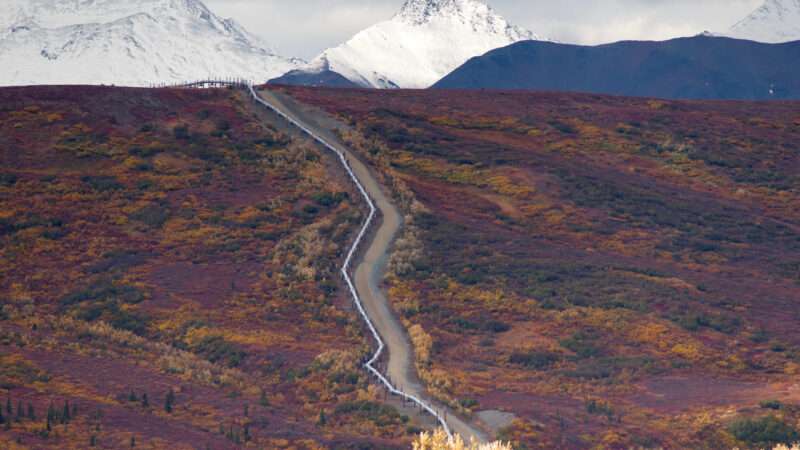
Alaska is an energy behemoth with massive reserves of oil, natural gas, and petroleum. It also, oddly, faces a looming natural gas shortage—not good for a state where half of electricity production depends on the stuff. The problem is that most natural gas deposits are far from population centers and pipelines to transport the gas don't yet exist and may never be built. So, to get gas to Alaskans, you need to transport it by ship. But federal law requires that only U.S.-flagged liquid natural gas (LNG) carriers be used, and there aren't any.
Vast Energy Reserves
Alaska really is a powerhouse. According to the U.S. Energy Information Administration, the state's "proved crude oil reserves—about 3.2 billion barrels at the beginning of 2022—are the fourth-largest in the nation." It's "recoverable coal reserves are estimated at 2.8 billion tons, about 1% of the U.S. total." And, most impressively, Alaska's "proved natural gas reserves—about 100 trillion cubic feet—rank third among the states."
With that much natural gas to draw on, it's no wonder the state gets about half of its total electricity from generators powered by natural gas, with roughly three-quarters of power to the main Railbelt grid coming from gas. Nevertheless, the lights could soon flicker—and a lot of people's furnaces and stoves sputter—because of lack of access to the vast natural gas reserves.
"Alaska lawmakers are searching for solutions to a looming shortage of natural gas that threatens power and heating for much of the state's population," Alaska Public Media reported in February. "The state's largest gas utility is warning that shortfalls could come as soon as next year – and imports are years off."
But Not Where It's Needed
It turns out that the gas Alaskans use comes not from the vast North Slope reserves, but from wells in the Cook Inlet. Most companies say it's not worth their time to drill there, and so sold their leases to Hilcorp over 10 years ago. Hilcorp is a Texas-based company that specializes in getting the most out of declining oil and gas wells—and the existing Cook Inlet wells are decades old and long past their peak. The company expects to produce about 55 billion cubic feet of gas this year but predicts production will fall to 32 billion cubic feet in 2029.
If few companies want to drill more wells in the Cook Inlet, it makes sense to draw on the natural gas in another part of Alaska, the North Slope. In 2020, federal and state officials approved a pipeline to transport gas from the North Slope to the Kenai Peninsula for local use as well as export. But building another pipeline across rugged Alaska is a massive undertaking and the project has struggled to find backers. It won't be ready for years, if ever.
That leaves transportation by sea. The gas could be transported from the North Slope by LNG carrier and offloaded in the populated areas where it's needed. But there's a hitch.
No Ships for You
A century ago, Congress passed the Merchant Marine Act of 1920 (better known as the Jones Act) to prop up the country's shipping industry. The law "among other things, requires shipping between U.S. ports be conducted by US-flag ships," according to Cornell Law Schools's Legal Information Institute. The ships must also be built here. So, to move natural gas from one part of Alaska to another, you need American LNG carriers. And here we find another shortage.
"LNG carriers have not been built in the United States since before 1980, and no LNG carriers are currently registered under the U.S. flag," the U.S. Government Accountability Office found in 2015. And while there's lots of demand for more LNG carriers for the export market, not just for Alaska, "U.S. carriers would cost about two to three times as much as similar carriers built in Korean shipyards and would be more expensive to operate."
U.S. Customs and Border Protection did make an exception to let foreign LNG carriers transport U.S. natural gas to Puerto Rico earlier this year, but only because the gas was first piped to Mexico before being loaded onto ships. Isolated Alaska doesn't have that option.
The feds are diligent about prosecuting Jones Act violations, too. In 2017, the U.S. Department of Justice imposed a $10 million penalty on an energy exploration and production company for transporting a drill rig from the Gulf of Mexico to Alaska's Cook Inlet in a foreign-flagged vessel. That company's intention was to bring more natural gas to market in Alaska.
Given the law's strict terms and the government's enthusiastic enforcement, "it will be perfectly legal for ships from other countries to pick up liquid natural gas from the new production facility in northern Alaska—as long as they don't stop at any other American ports to unload," Reason's Eric Boehm noted in 2020.
When Boehm wrote, the century-old protectionist law contributed to high prices for Alaskans. Now it may actually precipitate a crisis by making it effectively illegal for energy companies to ship abundant natural gas from one part of the state to eager customers in another.
A Law In Need of Repeal or Relief
In 2018, the Cato Institute's Colin Grabow, Inu Manak, and Daniel J. Ikenson delved into the damage done by the Jones Act in terms of higher costs and distorted markets, even as it fails to keep the domestic shipping industry from withering. The authors called for the law's repeal. Failing that, they recommended the federal government "grant a permanent exemption of the Jones Act for Alaska, Hawaii, Puerto Rico, and Guam." These isolated jurisdictions suffer the most from Jones Act protectionism and would benefit from greater leeway for foreign shipping.
Until that happens, Alaskans may suffer from a natural gas shortage while having plenty of the stuff to sell to the rest of the world.
The post Archaic Federal Law Keeps Alaskans From Using Abundant Natural Gas Reserves appeared first on Reason.com.







